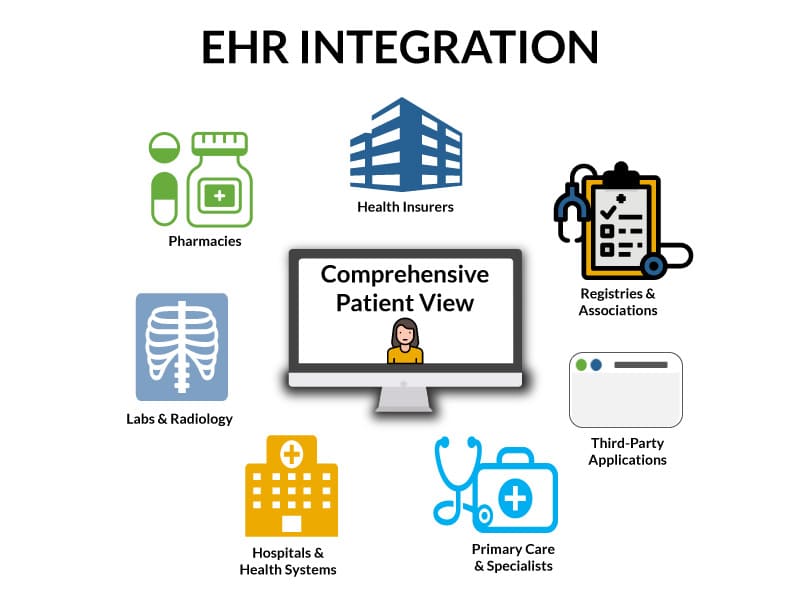n the evolving landscape of healthcare, EHR and Telemedicine have become pivotal in enhancing patient care and operational efficiency. Integrating Electronic Health Records (EHR) with telemedicine solutions allows healthcare providers to streamline processes, improve accessibility, and deliver better outcomes. For online doctor platforms like MedTele, EHR integration ensures that patient information is secure, accessible, and up-to-date, allowing for more effective virtual consultations and treatment plans.
What Are Electronic Health Records (EHR)?
Electronic Health Records are digital versions of a patient’s paper charts. They contain comprehensive information such as medical history, diagnoses, treatment plans, immunization dates, allergies, laboratory test results, and other critical health data. Unlike traditional paper records, EHRs can be updated in real-time and shared instantly among authorized healthcare providers, ensuring a seamless flow of information across the healthcare ecosystem.
The Importance of EHR in Online Healthcare Systems
Enhanced Patient Care: One of the primary advantages of integrating EHRs into online healthcare systems is the significant improvement in patient care. When a doctor has immediate access to a patient’s comprehensive medical history, including past diagnoses and treatments, they can make better-informed decisions during virtual consultations. This real-time access to information ensures that any treatment prescribed is aligned with the patient’s existing medical condition.
Streamlined Operations and Efficiency
EHR integration in online healthcare platforms reduces administrative tasks, allowing healthcare providers to focus more on patient care. Automating tasks like appointment scheduling, prescription management, and billing not only saves time but also reduces errors. This results in a more efficient healthcare process that benefits both patients and providers.

Improved Data Accuracy and Accessibility
Manual record-keeping is prone to human error, and illegible handwriting can lead to misunderstandings or incorrect treatments. EHRs eliminate these issues by providing standardized, clear, and easily accessible digital records. For online healthcare systems, this is especially important, as it allows for accurate diagnoses and treatments during virtual consultations, where quick access to reliable data is essential.
Seamless Coordination Among Healthcare Providers
In traditional healthcare settings, sharing patient information between different providers can be a slow and error-prone process. EHRs integrated into online healthcare systems enable seamless coordination by allowing multiple providers to access and update patient records simultaneously. Whether it’s a specialist consultation or follow-up care, all involved parties have access to the same up-to-date information, leading to better overall patient outcomes.
Enhanced Patient Engagement
EHR systems often include patient portals where individuals can access their medical records, schedule appointments, and communicate with their healthcare providers. This level of transparency and accessibility encourages patients to take a more active role in managing their health, leading to better adherence to treatment plans and preventive care measures.
Overcoming Challenges in EHR Integration
Despite the clear benefits, integrating EHRs into online healthcare systems is not without challenges. Data security is a primary concern, as sensitive patient information must be protected against breaches. Platforms like MedTele prioritize the use of advanced encryption methods, multi-factor authentication, and strict access controls to safeguard EHR data. Improved Data Accuracy and Accessibility HIMSS.org to support the discussion on how EHR systems enhance efficiency and data management
Another challenge is ensuring system interoperability. EHR systems must be compatible with a variety of healthcare providers’ software and platforms to facilitate seamless data sharing. MedTele addresses this by adhering to industry standards and protocols that promote interoperability, ensuring that the platform can work efficiently with external systems.
The Future of EHR in Online Healthcare
The future of EHR in online healthcare looks promising, with emerging technologies like artificial intelligence (AI) and machine learning set to enhance EHR functionalities. AI algorithms can analyze EHR data to identify trends, predict patient outcomes, and even assist in decision-making during virtual consultations. As telemedicine continues to grow, EHR systems will play an increasingly vital role in delivering quality healthcare remotely.
<h2.Conclusion
Integrating EHRs into online healthcare systems like MedTele is a game-changer for both patients and providers. From improved patient care and streamlined operations to better data accuracy and security, EHRs offer numerous advantages that align perfectly with the goals of modern telemedicine. As digital healthcare continues to evolve, EHR integration will remain at the forefront, ensuring that patients receive the best possible care, regardless of where they are located.

